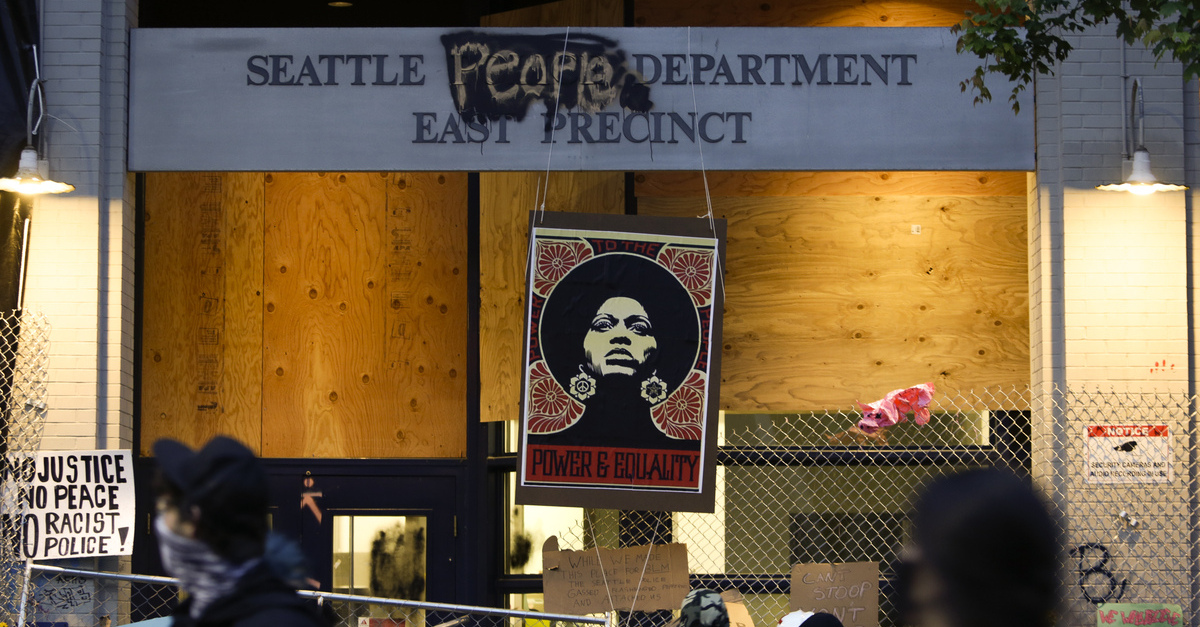
An image of activist Angela Davis is displayed above the entrance to the Seattle Police Department’s East Precinct, vacated June 8, and now surrounded by streets reopened to pedestrians forming an area named the Capitol Hill Autonomous Zone (CHAZ) in Seattle, Washington on June 12, 2020.
The Seattle Police Department (SPD) said they would lay off more than 50-percent of their Black, Indigenous and other non-white officers in response to the Seattle City Council’s proposed budget cuts.
Those substantial cuts, which seem likely to pass at present, are themselves in response to “Defund the Police” activism and organizing that quickly became a nationally recognizable aspect of the Black Lives Matter movement following the Minneapolis Police Department’s killing of George Floyd in late May.
Decriminalize Seattle and King County Equity Now spearheaded the effort, premised on a four-point plan that would: (1) disassociate 911 dispatchers from the SPD; (2) increase civil society-based solutions to public safety; (3) fund community-led initiatives to “imagine life beyond policing”; and (4) drastically ramp up investments in affordable housing.
Decriminalize Seattle’s Jackie Vaughn described “the pathway to defunding the Seattle Police Department and building a world where we trust and believe in community to provide the safety that we need” during a virtual press conference on Thursday.
After that event wrapped up, the coalition had amassed pledges from a super-majority of Seattle City Council members in support of a 50-percent police department budget cut. The SPD quickly sprang into damage control mode after those commitments were made.
“While no decisions have been made yet, we wanted the community to be aware of the situation,” the SPD said via their official Twitter account on Friday. “Laying off 50% of the department would be catastrophic for public safety in the city of Seattle.”
“The Department has made a conscious effort to hire employees, both sworn and civilian, who represent the diversity and values within our community,” the thread continued. “Cuts this deep mean we would lose more than 50% of our (BIPOC) officers. These officers’ life experiences make us a better department and community.”
Critics quickly took issue with the SPD’s threat based on the law enforcement organization’s own in-house statistics which state that more than 70-percent of sworn SPD officers are white.
“[W]hy would you fire them first though,” The New Republic’s Alex Pareene wondered.
“Wait this doesn’t make sense unless the jobs SPD considers critical have been disproportionately filled by white employees,” commented popular online legal personality Respectable Lawyer. “And that would be crazy.”
Jonathan Ben-Menachem, who writes on legal topics for The Appeal, tweeted a tongue-in-cheek criticism of the department’s diversity messaging: “[I]f you care about an Inclusive, Diverse police force, figure out a way to fire the old white ones maybe.”
“If the Seattle police department truly cares about diversity, it should look for a way out of ‘last in, first out’ police union contract language,” Ben-Menachem told Law and Crime by email. “Criminalized Seattle residents are calling for police divestment, not an expanded and diversified police force.”
“I will fiercely advocate that we focus on realistic, rational and responsible solutions–not political gestures, or pandering or political posturing,” Seattle Police Chief Carmen Best said in a YouTube address to fellow officers that launched the controversial Twitter thread. “I will not ask the people of Seattle to test out a theory that crime goes away if police go away.”
As of this writing, at least seven members of the Seattle City Council have pledged their support for the 50-percent SPD budget cut–including: Socialist Alternative’s Kshama Sawant as well as Democrats Tammy Morales, Teresa Mosqueda, M. Lorena González, Lisa Herbold, Dan Strauss and Andrew Lewis.
Seattle Mayor Jenny Durkan, a Democrat, opposes the effort.
[image via JASON REDMOND/AFP via Getty Images]
Editor’s note: the acronym BIPOC stands for Black, Indigenous and people of color and was developed to”highlight the unique relationship to whiteness that Indigenous and Black (African Americans) people have, which shapes the experiences of and relationship to white supremacy for all people of color within a U.S. context,” according to the BIPOC Project, which recently began advocating for its use.
This article has been amended post-publication to include an additional quote, a link and for statistical clarity. The article originally noted that “over 50% of sworn SPD officers are white.” That number actually exceeds 70%. An organizational affiliation for a source that recently became out-of-date was updated as well.